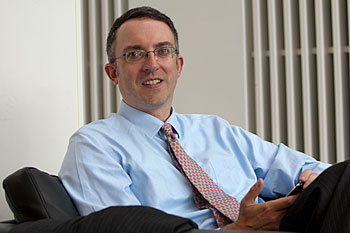Alumni Affairs charts a course for social media engagement
The number of people using social media -- Facebook, LinkedIn, Twitter and more -- to connect with their classmates and alma maters is burgeoning. This year, Cornell's Office of Alumni Affairs took the unusual step of hiring an expert to create an alumni relations strategy for the ever-changing social media landscape.
Now that he's been at Cornell for a few months, we asked Andrew Gossen, senior director of social media strategy for Alumni Affairs, to comment on how he sees that relationship evolving.

Andrew Gossen, senior director of social media strategy for the Office of Alumni Affairs.
Is it good for Cornell that there are tons of alumni groups on Facebook, LinkedIn, etc.?
Absolutely. The last thing in the world we should do is interfere with existing communities of Cornellians. In fact, we've been doing a series of "Social Media 101" training sessions with class and club volunteers in hope that more of them will join in those spaces. There's a huge, multidimensional online conversation out there about various aspects of Cornell. Instead of barging in and attempting to set the terms, we should be looking for a seat at the table.
What's the biggest challenge in social media for alumni relations?
Social media threw a monkey wrench into a machine that served American higher education well for a long time. Alumni used to depend on the alumni office because it had the alumni database, and no large-scale interaction was possible without it.
Now, in a Web 2.0 world, alumni have the tools to organize themselves and engage each other in the name of and about their alma mater without assistance or permission from anyone. Alumni relations offices are struggling to adjust to a reality in which they've lost their monopoly on information, communication and control. The only way to adjust in a productive and strategic way is to completely surrender any illusion of control as a starting point.
What relationship do you think a university should have with its alumni online?
Many institutions think of social media as simply another channel for distributing the same content that is disseminated through more traditional means, but that misses the unique nature of the evolving social Web space. Social media gives us the chance to communicate with alumni with a frequency and level of informality that makes it possible for Cornell to be a daily presence in their lives.
Some people will shy away from anything they perceive to be institutionally packaged, and that's fine. Those who do choose to engage get the opportunity to stay on top of what's happening at Cornell and in the alumni community, and to interact with us and each other about it.
Higher ed is fortunate in that our product -- teaching and scholarship -- is very valuable stuff. If we package it right, social media channels can really showcase the best, most exciting things about Cornell, and the people involved, to a truly global audience.
What are the emerging social media trends that look promising?
The two things that fascinate me right now are social magazines and geolocation. Both strike me as opportunities to deliver interesting and useful content about Cornell and Cornell alumni activity.
Social magazines -- in which at least a portion of the content is determined by feeds from the users' social networks -- strike me as the first plausible way forward that I've seen for print journalism, the woes of which are well known. The best example of this right now is Flipboard, which is only available so far on the iPad.
Geolocation, in which a user's mobile device knows where it is, makes it possible to deliver high-value content that's useful right then and right there. A good example of this is Yelp: It can show you various types of businesses like restaurants, hotels, etc., near your location, tell you how to get there, and show you reviews submitted by other users.
What cool things have you launched so far?
The mobile Reunion website we debuted this year was well received, and we'll be looking to make it even more useful and user friendly.
We were one of the first universities out of the gate with a page on foursquare, the geolocation check-in game. I'm not sure it has been widely used by alumni, but it clearly has been used heavily by the incoming first-year class -- participation has exploded since mid-August.
What's up next?
The name of the game is experimentation and incremental progress. For the next year or so, we'll be looking to involve even more alumni in our existing Facebook and LinkedIn channels. We're kicking around ideas about how we can make event information available on mobile devices, so that your smartphone can tell you what alumni events are happening close to you, anywhere you are. We're also making alumni.cornell.edu much more social, adding things like plug-ins that show people how their friends are interacting with content on the site.
We'll also be experimenting with different types of content to figure out how best to engage people. When we get the type of engagement we're looking for, we'll do everything we can to figure out why it's working and how we can apply those lessons elsewhere.
Links:
Chronicle Online: Three experts join Alumni Affairs to pilot new programs
A few Cornell social media websites:
Facebook: Cornell Alumni Association
Foursquare: Cornell University
LinkedIn: Cornell Alumni Network